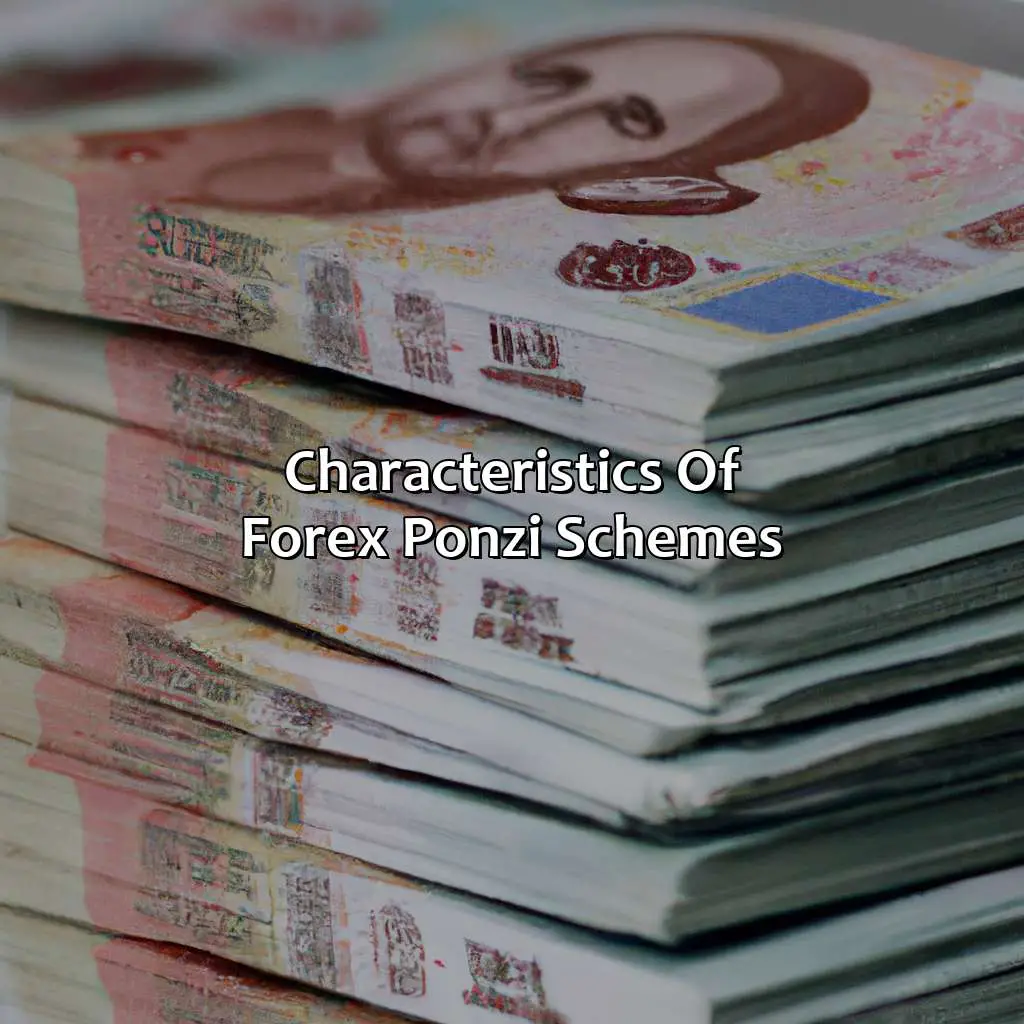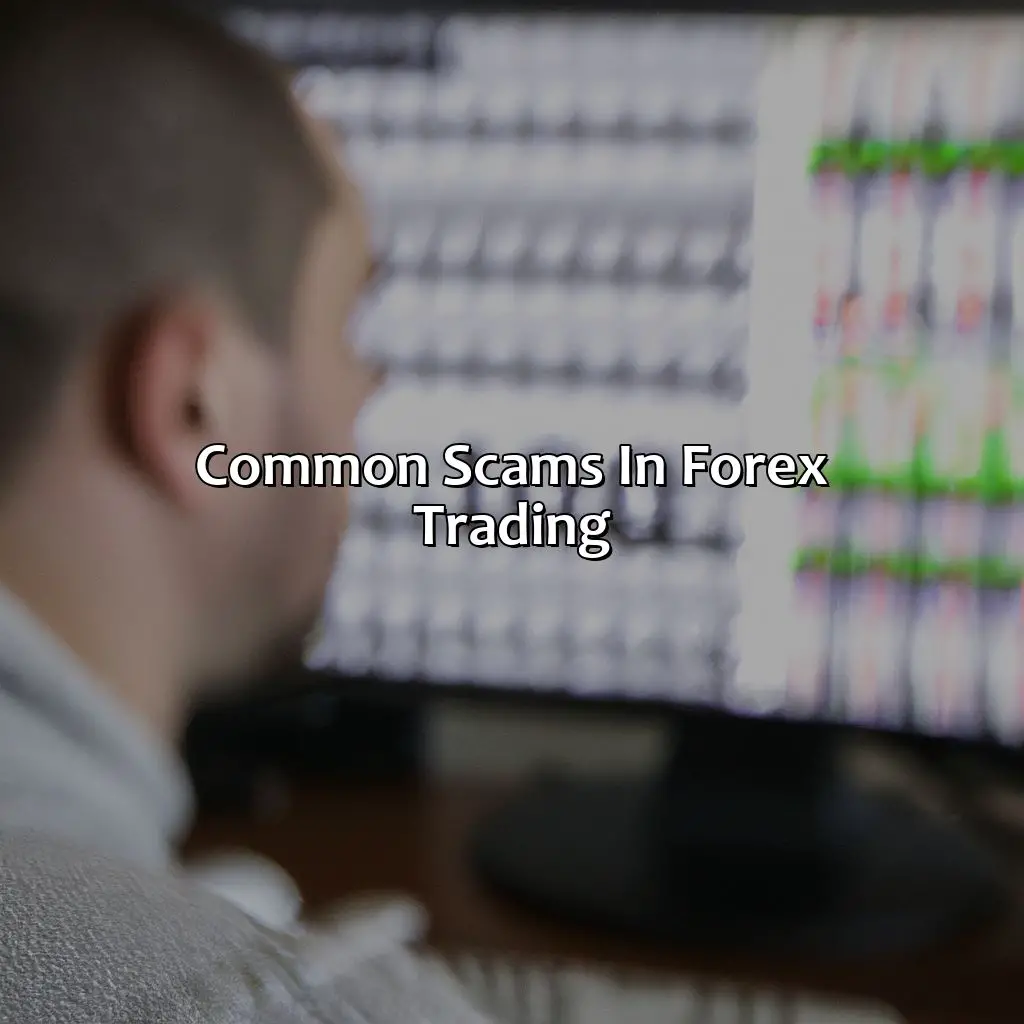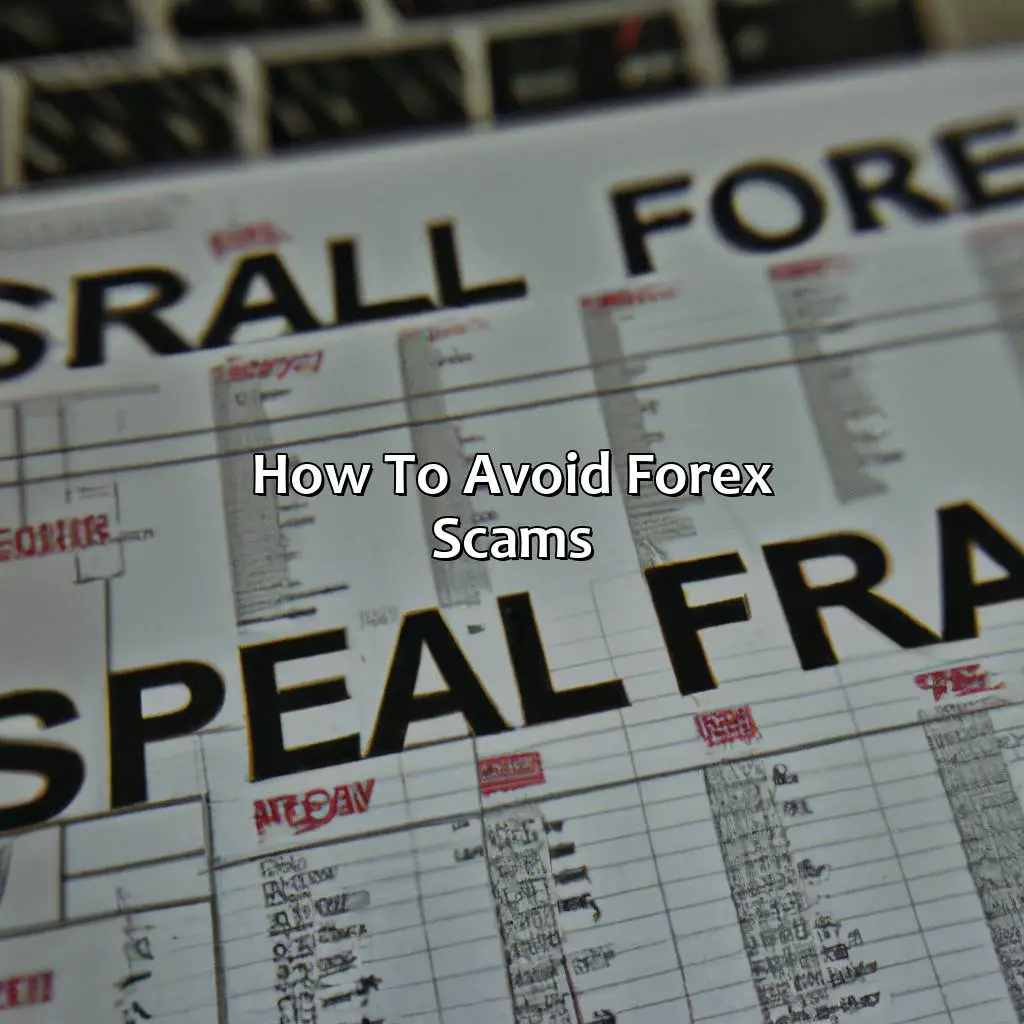The forex industry has seen an increase in fraudulent activities over the years, leading to significant losses for unsuspecting traders. Understanding the types of forex scams can prevent traders from falling victim to these schemes.
The following are some common types of forex scams:
- Forex Broker Scam: Some brokers may engage in unethical practices, such as manipulating prices or delaying trade executions, leading to significant losses for traders.
- Forex Investment Scam: Scammers may promise guaranteed returns or high profits, but in reality, they use investors’ money to fund their own lifestyles or pay off other investors.
- Forex Signal/Robot Scam: These scams promise high profits by providing trading signals or robots that trade on behalf of traders. However, the signals or robots are often faulty or manipulated, leading to significant losses.
It is important to conduct thorough research on brokers and investment opportunities before investing. Moreover, traders should exercise caution and skepticism when approached by individuals promising high profits with minimal risk in forex trading.
Additionally, in 2019, a forex scam investigation led to the arrest and conviction of a group of fraudsters who used false advertising and fake testimonials to defraud over 1000 victims of millions of dollars.
To avoid falling prey to these scams, traders can educate themselves on how to identify fraudulent activities and report any suspicious behavior to the relevant authorities. It is essential to stay vigilant and aware in the face of these typical forex scams to safeguard one’s investments.
Characteristics of Forex Ponzi Schemes

Photo Credits: forexbrokerreport.com by Austin Torres
Understand characteristics of a Forex Ponzi Scheme! ‘What is a typical forex scam?’ This section breaks into three parts:
- Misleading Promises of High Returns
- Lack of Transparency
- Pyramid Structure
These sub-sections give warning signs. Investors should be on the lookout for these signs to avoid becoming victims of a forex pyramid or bonus scam.
Misleading Promises of High Returns
Forex scams often involve fraudulent entities who deceive investors with misleading promises of high returns. These scammers present themselves as experts in the field, often using flashy marketing materials to lure unsuspecting victims into their trap.
They may claim to have secret strategies, insider knowledge, or exclusive access to high-yield investments that can deliver almost unrealistically high profits. However, such promises are usually too good to be true and serve only as a tactic for scammers to attract more victims.
In addition to these false claims of high returns, forex Ponzi schemes also typically lack transparency. They do not provide detailed information about how they generate income or distribute profits and typically prey on inexperienced investors who don’t conduct due diligence before investing.
Investment scams often follow a pyramid structure where early investors receive promised returns using money from later investor’s contributions. Such schemes are ultimately unsustainable and collapse when there aren’t enough new contributors to support the payouts.
A red flag for any investment opportunity is receiving unsolicited phone calls or emails urging you to invest quickly. Lack of proper licensing and regulation for alleged financial institutions has been linked significantly with several cases of scam culprits exploiting this negligence and making off with investor funds.
Recently, many cases were reported where the ‘expert’ signal sellers or robot trading scams even shared fake positive reviews. Scams like Phishing involve pretending as legitimate Forex companies tricking unwary traders into submitting uncompromising private information through fake emails or websites.
To protect oneself from these types of scams, it is crucial to carry out thorough due diligence on potential investment opportunities and brokers before committing any capital. Be cautious and remain skeptical when pitched over-the-top promises of outsized returns by unlicensed entities.
One such story took place back in 2014 when an unregistered forex trading company in California stole approximately $15 million from its clients by making similar type of tantalizing promises of outrageous profits causing great financial distress among its misled clients. Therefore, investors should be vigilant against such grandiose promises and do not hesitate to take a backseat when it comes to investing their hard-earned money.
Why be transparent when you can hide behind complexities and keep investors in the dark?
Lack of Transparency
The absence of appropriate information regarding investments is called Lack of Transparency. Such absence creates an opportunity for the fraudsters to lure investors into investing in their schemes. In such scams, the criminals do not reveal crucial details about their plans that can help investors make informed decisions.
Fraudsters often try to hide facts and figures or claim they are too complex for regular investors to understand. Investors should not rely on incomplete analyses and vague explanations while investing their hard-earned money.
In such cases, a little bit of research can go a long way. Investors can look up reviews online or ask professionals in the field before putting any money into schemes that lack transparency.
Pro Tip: Always ensure that you fully understand all aspects of your investment strategy, including its risks and benefits. Avoid dealing with individuals who create an atmosphere of secrecy around investments.
Forex Ponzi schemes use a pyramid structure that ultimately leaves investors at the bottom.
Pyramid Scheme Structure
Forex ponzi schemes often use a pyramid scheme structure to deceive investors. In this model, a single entity is positioned on the top, and underneath them lies several levels of new members, forming a pyramid shape.
To elaborate, at each level of the pyramid, new members are required to recruit other members to join the same investment opportunity. The assumption here is that an investor will earn profits through their recruits’ investment and receive commissions for bringing in new members. This mechanism attracts gullible investors who hope to make quick money without investing much effort.
Below is a table that illustrates the typical structure of a Pyramid Scheme used in forex scams:
| Level | No. of members | Earnings |
|---|---|---|
| 1 | 1 | $x |
| 2 | 3 | $3x |
| 3 | 9 | $9x |
| 4 | 27 | $27x |
As we move down the chain, the number of members increases exponentially while the earnings get distributed linearly among all previous levels.
It’s essential to understand that Pyramid schemes are illegal and unsustainable as they require endless recruitment, with only those at the top earning profits while those below losing their investments.
Investors need to be aware of signs that indicate investment opportunities offer too good to be true returns or rely heavily on recruitment as their revenue source. It’s wise to choose licensed brokers who offer transparent and regulated Forex trading services.
To avoid falling victim to Forex scams, potential investors must carry out due diligence before committing any funds in an opportunity; don’t get carried away by unrealistic promises or high-pressure sales tactics; look out for regulatory compliance from authorities such as CySEC (Cyprus Securities Exchange Commission) or other international bodies that regulate Forex trading activities.
Keep your guard up against unsolicited investment offers and pressure tactics in forex trading – they could be a scam waiting to happen.
Red Flags to Look Out for in Forex Investment Opportunities

Photo Credits: forexbrokerreport.com by Jason Campbell
Beware of forex scams! To guard against them, you must be able to recognize red flags in forex investment opportunities. In this section, ‘Red Flags to Look Out for in Forex Investment Opportunities‘, we’ll show you the typical strategies used by fraudulent forex signal services, account managers, and brokers. Such as unsolicited phone calls and emails, pressure to invest quickly, and lack of regulation or licensing. With this skill, you can safeguard your investments and dodge being a prey to forex scams.
Unsolicited Phone Calls and Emails
Unsolicited phone calls and emails are tactics used by forex scammers to lure their victims. These messages often come out of nowhere, promising huge returns on investments within a short time. They may even claim the investor has been randomly selected for exclusivity, making it hard for one to resist. However, most of these messages target multiple people, not just an individual.
To avoid getting into scam traps through unsolicited phone calls and emails, it is best to ignore them altogether. One should never disclose personal or financial details to someone that contacts them out of the blue. Furthermore, in case they have any suspicions or doubts about the validity of such investment opportunities, they must conduct further checks before acting.
It is crucial that one disengages scammers from any conversation quickly without disclosing any information. Scammers use emotional appeals such as urgency and exclusiveness knowing it can throw you off-balance in decision-making. Therefore, stay calm, cautious and be aware that it could happen anytime so keep your guard up at all times.
Don’t let the pressure cooker turn your wallet into a pressure cooker too.
Pressure to Invest Quickly
When presented with a forex investment opportunity, scammers often apply ‘Impulse Tactics’ to rope unsuspecting individuals into their scheme. These tactics usually involve creating an atmosphere of urgency and pressure that encourages investors to invest as quickly as possible. By doing this, the investor does not have enough time to carry out due diligence on the scammer or adequately evaluate the investment opportunity, leading them to make hasty decisions.
As a result, it is essential to place trust only in credible sources and avoid making decisions based solely on perceived pressure from scammers. Scammer’s mentality is ‘now or never,’ putting emphasis on the importance of investing ‘right away’ or losing out on potential profits.
Forex scams mostly take advantage of the investor’s desires for high returns with minimum efforts. Thus, getting involved requires caution so that people do not fall prey to offers that seem too good to be true.
To avoid falling victim to these scams and prevent pressure when investing in forex trading opportunities; it’s advisable to verify information regarding brokers, read reviews online, talk with experts who can provide meaningful insights about engaging platforms.
By demanding more information at your own pace instead of responding hastily under immense pressure, you are less likely – if ever – making an unguarded decision that may cost you greatly later on.
If the forex investment opportunity lacks regulation or licensing, it’s like playing Russian roulette with your money.
Lack of Regulation or Licensing
In the world of forex trading, scams are widespread and can lead to significant financial loss. One of the most common characteristics of such scams is the lack of regulation or licensing. Without proper regulation, fraudulent companies can operate with impunity and take advantage of unsuspecting investors.
Investors must beware of non-licensed brokers who offer potentially lucrative investment opportunities. These brokers may manipulate trading software, provide little to no information about their management team, or operate without a physical address.
Moreover, these scam artists often claim that they have registered with a regulator when they haven’t. Investors must verify all claims made by brokers regarding regulatory transparency.
It is essential for traders to do their research before trusting any forex broker with their hard-earned money. Traders should confirm that the broker has a legitimate license from a recognized regulatory body in their area.
According to a report by the U.S Commodity Futures Trading Commission(CFTC), there are an estimated $10 billion in losses yearly due to forex scams attributed largely to lack of regulation or licensing.
Be aware of the global reach of forex scammers, from Ghana to India to South Africa and beyond, using tactics like copy trading, binary options, and automated bots to lure in unsuspecting victims.
Common Scams in Forex Trading

Photo Credits: forexbrokerreport.com by Terry Wilson
To understand Forex scams, study ‘What is a typical forex scam?’ We will analyse scams in Ghana, India, South Africa, Malaysia and the Philippines. Let’s look at 3 sub-sections of Forex scams:
- Signal Seller Scams
- Robot Trading Scams
- Phishing Scams
Signal Seller Scams
Signal seller scams involve individuals or companies who offer to provide signals and trading strategies for a fee. They claim to have expertise in the forex market and use this knowledge to generate profitable trades. However, many of these signal sellers are fraudulent and do not provide accurate information.
These scams often involve false claims of success rates and profits, which entice traders to subscribe to their services. In reality, these signal suppliers may be using misleading tactics such as cherry-picking successful trades or exaggerating their past performance. Some may even manipulate signals after they have been sent out.
One red flag to watch out for is when a signal seller provides limited information about their strategy or refuses to disclose their track record. Traders should also be wary of services that require upfront payments or lock them into long-term contracts without any guarantees of improvement in trading results.
In one example, a trader paid for forex signals from a well-known service provider but experienced consecutive losses. When he contacted the company for support and refund, the customer service representative became rude and unhelpful. It was later uncovered that the signal service provider did not actually have any expertise in forex trading and had simply relayed trades from another source without proper due diligence.
Robots may be better at trading than humans, but they won’t protect you from falling victim to forex scams.
Robot Trading Scams
Many scammers use ‘Robot Trading Scams‘ to con unsuspecting traders. They introduce automated trading software that supposedly makes trades on behalf of the investor and generates huge profits. In reality, such bots are a hoax to defraud investors of their funds.
The scammers make grandiose claims about the supposed legitimacy and accuracy of their software, but it’s nothing more than deception aimed at extracting money from gullible investors. They may also fabricate fake reviews from satisfied customers or provide false testimonials.
These scams often promise an ‘automated trading system,’ which they claim can earn back all of the investment in no time at all with minimal involvement required from the trader. The robots cannot predict market trends accurately, leading to losses for investors.
Traders should be aware of robot trading scams and how they work, as they have become increasingly prevalent in recent years. One victim claimed he lost over $20,000 after investing with an automated trading company that promised user-friendly software and high-profit margins but never delivered.
To avoid robot trading scams, traders need to stay vigilant by researching all opportunities thoroughly before investing. Additionally, they should only deal with licensed and regulated brokers who can demonstrate transparency around investments and trading strategies.
Why fish for profits when you can avoid phishing scams in forex trading?
Phishing Scams
Cybercriminals often use phishing scams to steal personal and financial information from individuals. These scams can come in various forms, such as emails or fraudulent websites, that appear to be legitimate sources of information. They aim to trick the victim into providing their sensitive information, such as login credentials or credit card numbers, through social engineering techniques.
Phishing scams are a form of fraud that relies on deception tactics to lure individuals into voluntarily providing their personal information. The attackers may use spear-phishing tactics, which target specific individuals based on their position within an organization or personal relationship with the attacker. In some cases, the attackers may create fake websites that resemble legitimate ones to collect user data.
It is important not to trust any unsolicited communication asking for personal or financial details. To avoid falling prey to phishing scams, individuals should verify the authenticity of a sender or website before entering any sensitive information. Always scrutinize the URL and look for signs that it is a secure site, such as HTTPS instead of HTTP.
Be vigilant when accessing online accounts and banking on public WiFi connections as these networks are more susceptible to man-in-the-middle attacks. Protecting yourself from phishing scams requires staying informed of new threats and avoiding complacency online at all times. Failing to do so could result in identity theft and financial losses which could prove costly in several ways.
Don’t be a victim of forex scamming – arm yourself with knowledge and diligence to protect your investments.
How to Avoid Forex Scams

Photo Credits: forexbrokerreport.com by Raymond Lee
To dodge forex scams, it’s a must to take precautionary steps. Here are the sub-sections to follow:
- Due Diligence: Performing due diligence can help you avoid common forex scams, such as scamming in the Philippines, internet scams, and scam recovery.
- Skepticism of Unrealistic Promises: Being dubious of outrageous promises protects you from forex trading scams in Malaysia, Singapore, Philippines, India, South Africa, Nigeria, Pakistan, Ghana, UK, Australia, and UAE.
- Licensed & Regulated Broker: Only selecting licensed and regulated brokers can keep you away from forex scam broker lists.
Carry Out Due Diligence
Investors need to perform thorough due diligence before investing in any forex opportunities. This means carrying out research on both the broker and the investment itself. Investors should start by verifying that the broker is properly registered and regulated by a credible regulatory agency.
In addition, investors should analyze the investment opportunity before committing funds. This includes assessing the legitimacy of any returns being promised and evaluating the risks involved with the investment. Investors can also seek reviews from other traders who have experience with the same broker or investment opportunity to get a better understanding of its performance.
It’s important to refrain from making decisions based on limited information or gut feelings alone. Instead, investors should gather all necessary information through thorough research and analysis before deciding whether an investment is worth pursuing.
Performing due diligence can help investors avoid scams and fraudulent activities within the world of forex trading, thereby helping them make well-informed decisions based on facts rather than emotions.
By understanding this process, investors can protect themselves against potential losses caused by fraudulent brokers or scam investments in forex trading.
Empty promises in forex trading are like a mirage in the desert, they’ll leave you thirsty for profits but only lead to disappointment.
Be Skeptical of Over-the-Top Promises
When it comes to forex trading, high returns are often promised by unscrupulous companies or individuals. It is important to be wary of such over-the-top promises, as they may be a sign of a scam. Always check the legitimacy of any company that is offering unrealistic gains, including their track record and history of positive reviews.
Furthermore, avoid investing in anything that seems too good to be true without due diligence first. Many scams will try to pressure potential investors into making hasty decisions without providing sufficient information or time for consideration. This is often when red flags are raised, indicating that something might not be legitimate about the investment opportunity.
To avoid falling victim to forex scams, take note of companies that claim no risk and only profit – a surefire way to lure in unsuspecting investors. A trustworthy investment plan acknowledges both profit and loss potentials with strict policies regarding withdrawing funds.
By being skeptical of over-the-top promises when presented with potential forex investments and staying up-to-date on regulator guidelines for firms operating within financial markets, as well as educating oneself about the various types of scams out there (signal seller scams, robot trading scams, phishing scams), traders can protect their money while working toward building capital growth.
Stay safe from Forex scams by choosing a licensed and regulated broker for your investments.
Choose a Licensed and Regulated Broker
Select an authorized and monitored intermediary while trading Forex. Licensed brokers must comply with industry regulations, which safeguard your money and guarantee transparent trading. Ensure to verify the legitimacy of a broker before investing.
Five Facts About Typical Forex Scams:
- ✅ Forex scams typically promise quick and easy profits with minimal risk. (Source: Investopedia)
- ✅ Scammers often use high-pressure sales tactics to get investors to invest large amounts of money quickly. (Source: Securities and Exchange Commission)
- ✅ Forex scams may involve fake or fraudulent companies that do not actually engage in foreign exchange trading. (Source: Commodity Futures Trading Commission)
- ✅ Many forex scams operate online and may be difficult to trace or recover lost funds. (Source: Federal Bureau of Investigation)
- ✅ Some common warning signs of forex scams include promises of guaranteed profits, unsolicited offers, and unlicensed brokers. (Source: Financial Industry Regulatory Authority)
FAQs about What Is A Typical Forex Scam?
What is a typical forex scam?
A typical forex scam involves fraudsters promising high returns on investment through the foreign exchange market, but instead, they end up stealing the investors’ money.
How do forex scammers lure their victims?
Forex scammers lure their victims by promising high returns on investment, offering free seminars, using high-pressure sales tactics, and pretending to be licensed brokers or financial advisors.
What are some common tactics used by forex scammers?
Some common tactics used by forex scammers include offering guaranteed profits, requiring upfront payments or deposits, providing false information about their experience or track record, and creating fake trading accounts to show fake successful trades.
How can I spot a forex scam?
There are several red flags to look out for when it comes to spotting a forex scam, such as promises of guaranteed profits, unsolicited calls or emails, requests for upfront payments or deposits, and claims of no risk or losses.
What should I do if I suspect a forex scam?
If you suspect a forex scam, you should immediately stop all communication with the individual or company and report the incident to your local financial regulatory authority. You should also try to retrieve as much information about the scammer as possible to assist with the investigation.
How can I protect myself from falling for a forex scam?
To protect yourself from forex scams, do your research before investing, only work with licensed and regulated brokers or advisors, never give out personal information or banking details, and always be wary of promises of guaranteed profits or high returns.

